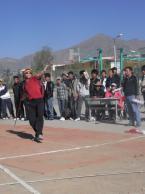Profile
Blog
Photos
Videos
Volunteer teaching
Learning a new language is difficult. Learning Tibetan is down right hard. However, being able to share your native language with someone as you learn their native tongue is a fascinating experience. This kind of language exchange is exactly what occurs in my life every Friday afternoon.
The class I help teach on Fridays is a group of young adults (shö nu) age 14-24, who dream of being tour guides, teachers, and translators. I met their teacher while playing pin pong on campus and we struck up a conversation. He asked if I would be interested in practicing my Tibetan with his students and helping them with their English. He was an interesting person because he spoke English so well and didn't have a Chinese accent. Most people in Lhasa if they speak English have a strong Chinese accent. I've decided a prominent Chinese accent is present in the English spoken here because students either are native Chinese speakers or they learned English from a native Chinese speaking teacher. So I was surprised when I came across someone who didn't have a strong accent in their spoken English. I immediately agreed to visit his class and we set up a visit for the following week.
For my first class I decided to start with the basics and do some situational language role playing. Prepared with the alphabet and some basic shopping vocabulary, I wrote the letters one by one on the dry erase board. The students responded well to the phonetic sounds of the alphabet, so I continued with some other difficult sounds like, "th," "ch," and "sh." This worked so well and the ability to sound out words is so important in reading, that I repeated it the next week and will continue to repeat it as a warm up at the start of each class.
Next, after having everyone introduce themselves by giving their name, hometown, and favorite thing or hobby, we began the shopping improvisational language role playing. I asked what kind of shopping they would like to do. And the overwhelming response was food shopping. I suggested clothes shopping to the class, but food it was. It turned out great. I made every one engage in one on one conversation with me. I wasn't evil and didn't give any curve balls. I gave them two common situational phrases and some vocabulary. The food options that the class and I finally came up with were; soda, chips, candy (chocolate), and chicken. Now, how chicken came up I don't exactly know but it did and the students loved it. Chicken turned out to be a very popular choice.
The way I ran the scenario was thus, I pretended to be a store keeper greeting and asked each student what they would like. The student would then reply with their order and then I would ask questions accordingly. How many? Is that all for you? Anything else? And of course, would you like a bag? As ordering or buying things in other countries is often stressful and tends to be one of the first as well as one of the most important things you need to do in a new country, learning to execute this task while staying calm is important. My students took to the exercise enthusiastically and they did well buying things from my imaginary store. After talking with their teacher after class I knew what the lesson (lopsten) would be for the next week, learning an American song.
Now what would be more interesting for youth in another country trying to learn American English than learning a song by Green Day? Well, I taught the class the song "Good Riddance" to be exact and it was a hit. Teaching the song and it's melody line by line, I made sure that the students had a better understanding of the song's meaning. Using both English and Tibetan I defined words and colloquial sayings from the lyrics of the song. I think the song was interesting for them and it gave the students a kind of window into American youth culture. Even though the song is from the mid-1990s I still hear it all the time in the US and I think it is really a part of American popular culture today. It's a new classic on the radio and you hear it played in baseball stadiums all over the country. Oh and I hear it is apart of Green Day's "American Idiot" Musical on Broadway. And what is more American than Broadway?
Next week, I think I'll continue my situational role playing with a fake trip to the post office. This will be fun because the students can decide what they want to send and where to send it, etc. I think I might throw in some twists with questions concerning accuracy of addresses, zip codes and if they want insurance. Because really, who doesn't like a trip to the post office? Usually in another country you will find yourself going to the post office at some point or another. This is why it is always good to practice because sending mail in another language won't get any easier.
Ja La Jayong, see you soon.
- comments










